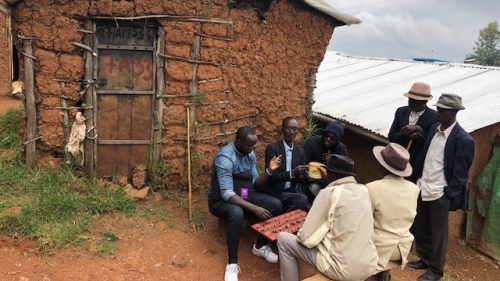
Mondiant Dogon’s debut memoir, Those We Throw Away Are Diamonds: A Refugee’s Search for Home, comes out today, October 12.
Dogon – who earned his master’s in International Education from Steinhardt in 2019 – began life as a Bagogwe Tutsi born in the Democratic Republic of Congo. In 1995 at the age of three, he and his family fled extreme violence and undertook a dangerous trek to Rwanda, where they lived in perilous conditions in refugee camps.
Life in the camps meant harsh conditions and little access to education – refugees were not eligible for schooling after the ninth grade. However, Dogon was lucky enough to find a sponsor so that he could attend high school. Afterward, he set his eyes on the goal of a college education – a very difficult task for a refugee.
“In Rwanda if you want to go to university, you must exceed the national exam standards,” said Dogon. “I was able to get high enough marks that the Ministry of Education sent me to the University of Rwanda, but when I got there, I found out I wasn’t eligible for financial aid and couldn’t stay on campus.”
Undeterred, Dogon collected the syllabi and books for his classes and took them back to the refugee camp, where he studied on his own. He traveled the two hours back and forth to campus only to take exams, sleeping in the classroom since he couldn’t afford a hotel room.
He graduated from university in 2016 and returned once again to the refugee camps, where he began teaching other refugees. He also began writing his memoir then, capturing his story and the stories of those around him who had been silenced.
“Many refugees, particularly women, didn’t want to talk about the atrocities they had experienced,” said Dogon. “Eventually they started accepting and trusting me to tell me about what they had been through.”
Dogon’s life took a miraculous turn when he met Tim Armstrong, former CEO of AOL, on an online network of video portals called Shared_Studios that began as an art project to connect strangers from around the world.
“I told Tim that I wanted to get my master’s degree, but I didn’t think that, as a refugee, I’d be able to go to school in America,” said Dogon. “A few weeks later, I got an email from him and NYU inviting me to apply.”
However, this next step wasn’t quite so easy: With no electricity or internet at his refugee camp, Dogon had to travel two hours by bus to use a computer, buying Wi-Fi access in 10-minute increments as that’s all he could afford on his $7-a-month stipend from the camp.
“It took me a month to fill out my application,” remembers Dogon.
But he was accepted, and he arrived at NYU and experienced immense culture shock, shifting suddenly from years in a Rwandan refugee camp to living in NYU’s Palladium Hall. At the advice of NYU and Armstrong, Dogon began his degree in International Education at Steinhardt.
“Thinking about my upbringing – attending school in the refugee camps, being a child soldier in the Congo who brought an AK-47 to class, experiencing school bombings – I brought all of these perspectives to the program,” said Dogon.
Today, Dogon works full time at a nonprofit organization he founded to empower young refugees – particularly women – to obtain an education. Owned and operated by refugees, Mondiant Initiative works with refugees in Rwanda and seeks to expand into other sub-Saharan African countries.
“Steinhardt gave me a stepping-stone to be where I am today,” said Dogon. “When I was back home in Rwanda, there was so much stigma about being a refugee that I didn’t want to share my story. At NYU, I learned how to embrace and be proud of who I am. This book is my way of breaking that silence and raising the voice of my people; it’s my story, but it’s also the stories of people like me all over the world.”
Those We Throw Away Are Diamonds: A Refugee’s Search for Home is published by Penguin Random House.
